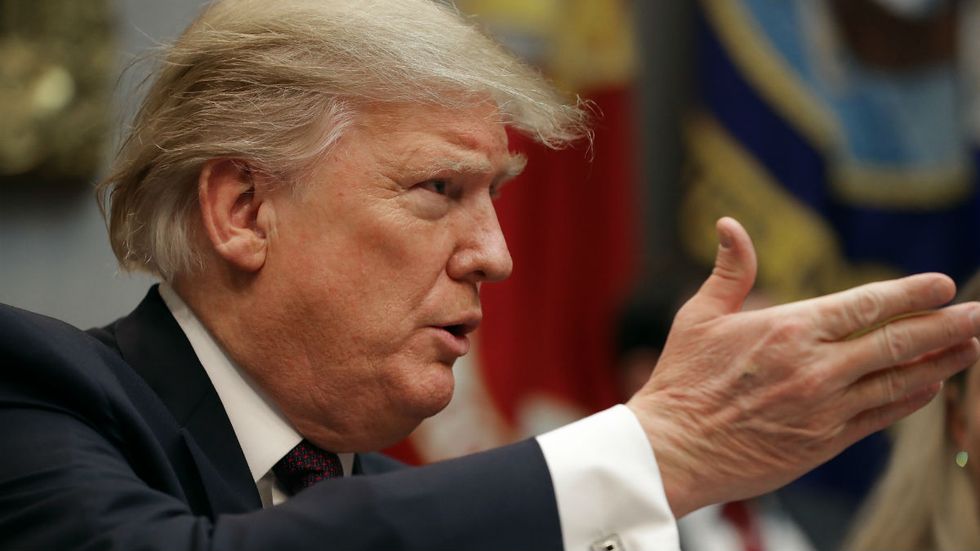
© 2025 Blaze Media LLC. All rights reserved.
The Trump administration actually issues a lawless exec action: Crickets from the courts
March 27, 2019
A broken clock is right twice a day, but a broken judiciary is never right. It’s a dead end for conservatives who want to protect real constitutional rights, but a one-way street for illegal aliens who want to break into our country and create new rights. The same courts that have opposed the Trump administration at least 63 times are suddenly shy about putting an injunction on Trump’s illegal designation of bump stocks as machine guns. The order retroactively criminalizes hundreds of thousands of American gun owners without a statute, which is also a violation of the Second Amendment and the constitutional prohibition against ex post facto laws.
As of today, thousands of Americans who own bump stocks and purchased them lawfully will be deemed as retroactive felons unless they destroy them or surrender them to the Bureau of Alcohol, Tobacco, and Firearms (ATF). No, this is not a law passed by Congress, which in itself would violate ex post facto rules, the Fifth Amendment (taking existing property without due process), and possibly the Second Amendment. It was an edict “passed” by Trump’s Justice Department in December in response to the Las Vegas massacre to reclassify bump stocks as machine guns, because of an attack about which we know nothing of the important details about the perpetrator(s) or motive.
This is not a question of whether we like executive actions in the abstract. Whenever the executive branch promulgates a rule, the two questions one must ask are A) Does the president have inherent constitutional authority to issue such a policy? B) If not, does he have statutory authority to issue it?
In this case, there is clearly no constitutional authority to regulate firearms or accessories without Congress. So what does the statute say? 18 U.S.C. Section 922(o) makes it unlawful to transfer or possess a machine gun. 26 U.S.C. 5845(b) defines a machine gun as “any weapon which shoots, is designed to shoot, or can be readily restored to shoot, automatically more than one shot, without manual reloading, by a single function of the trigger.” The simple laws of physics demonstrate that no matter how effective any bump-fire mechanism may be, the trigger still has to be engaged again for another shot to come out.
One can make a political argument for banning rapid shooting, but nobody in any administration ever argued that Congress meant to ban outcomes. They were banning machine guns, plain and simple. This definition was clearly understood for over 80 years since passage of the National Firearms Act of 1934. The bump-firing result can be achieved by affixing rubber bands and shoelaces to a semi-automatic rifle. There is no way bump-firing a semi-auto can be including in the mechanical definition of a machine gun, most certainly not the plastic device itself, which has no ability to shoot anything on its own. This edict was a classic Obama-type maneuver to get around the need for new legislation, but this time it was done by the Trump administration.
Last month, in response to lawsuits brought by gun rights organizations, Judge Dabney Friedrich, a Trump appointee to the U.S. District Court for D.C., bizarrely ruled that bump stocks could be included in the statutory definition of machine guns, even though she conceded that bump stocks require more shooter input than “a single function of the trigger,” as required to fit the statutory definition of a machine gun. This edict automatically creates a new felony, ownership of a bump stock, out of whole cloth.
A judge in Michigan rejected a similar lawsuit from gun groups, and appeals in both the D.C. and Sixth Circuits were rebuffed. Yesterday, the Supreme Court refused to step in.
Obviously, I’m not a fan of using the courts to settle political disputes. But this is not some abstract policy about how to run foreign policy or border security. This is directly addressing individual gun owners and implicates a right expressed in the Constitution in the most emphatic terms by retroactively treating them as felons punishable with up to 10 years in prison. Also, even if it was a legitimate congressional statute, it would violate the ex post facto rule, much as New Jersey just did with its retroactive ban of magazines that hold more than 10 rounds. This is the quintessential individualized case with irreparable injury-in-fact for which an American citizen can petition a court for relief. Yet this is the one time when the courts get gun-shy with injunctions.
This policy violates Art. I Sec. 10, which bars states from enacting ex post facto laws. The Supreme Court (Calder v. Bull, 1798) defines ex post facto as a law that “makes an action done before the passing of the law, and which was innocent when done, criminal; and punishes such action.” Crazily, with the courts commandeering every political issue from the political branches of government, granting citizens relief from ex post facto laws was the quintessential exercise of judicial review that Hamilton envisioned judges would use.
Lower courts have mandated that Trump continue Obama’s discretionary and often illegal executive power grabs and have placed universal injunctions on the president for simply reverting back to previous policies in place before Obama on a variety of labor, environmental, and education policies. Lower courts have violated the most established sovereignty doctrine of the Supreme Court and have taken over every aspect of immigration and our border, single-handedly spawning the worst migration crisis in our history. They have claimed the president doesn’t have the authority to shut down immigration when Chief Justice Roberts himself just said last year in Trump v. Hawaii that §1182(f) “exudes deference to the President in every clause” and that it “entrusts to the President the decisions whether and when to suspend entry, whose entry to suspend, for how long, and on what conditions.”
Yet here we are, months into lower court injunctions on the president’s power, with unimaginable consequences in human suffering and fundamental transformation of our country. Now the lower courts have found one Trump policy they finally like – his unilateral legislation to retroactively ban bump stocks – and Roberts is suddenly gun-shy about placing injunctions on the Trump administration.
#mc_embed_signup{background:#fff; clear:left; font:14px;}
/* Add your own MailChimp form style overrides in your site stylesheet or in this style block.
We recommend moving this block and the preceding CSS link to the HEAD of your HTML file. */
Want to leave a tip?
We answer to you. Help keep our content free of advertisers and big tech censorship by leaving a tip today.
Want to join the conversation?
Already a subscriber?
Blaze Podcast Host
Daniel Horowitz is the host of “Conservative Review with Daniel Horowitz” and a senior editor for Blaze News.
RMConservative
Daniel Horowitz
Blaze Podcast Host
Daniel Horowitz is the host of “Conservative Review with Daniel Horowitz” and a senior editor for Blaze News.
@RMConservative →more stories
Sign up for the Blaze newsletter
By signing up, you agree to our Privacy Policy and Terms of Use, and agree to receive content that may sometimes include advertisements. You may opt out at any time.
Related Content
© 2025 Blaze Media LLC. All rights reserved.
Get the stories that matter most delivered directly to your inbox.
By signing up, you agree to our Privacy Policy and Terms of Use, and agree to receive content that may sometimes include advertisements. You may opt out at any time.






